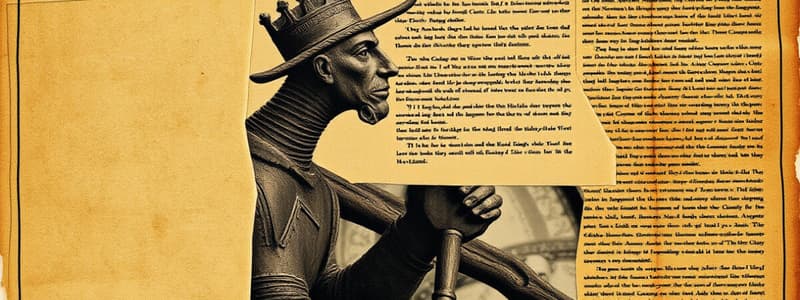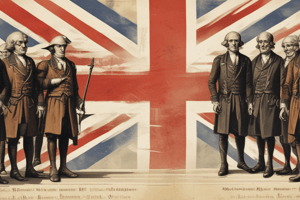Podcast
Questions and Answers
What were the key factors that led to King John's unpopularity among his subjects?
What were the key factors that led to King John's unpopularity among his subjects?
King John's unpopularity stemmed from increased taxes, his excommunication by Pope Innocent III, and his unsuccessful military campaigns in Northern France.
What was the role of the barons in the creation of the Magna Carta?
What was the role of the barons in the creation of the Magna Carta?
The barons initiated the Magna Carta as an act of rebellion against King John's oppressive rule and sought to outline their grievances and rights.
How did the absence of a clear successor influence the barons' rebellion?
How did the absence of a clear successor influence the barons' rebellion?
The lack of a clear successor after Prince Arthur's disappearance intensified the barons' focus on challenging King John's rule instead of finding an alternative king.
What historical document did the Magna Carta build upon, and what was its significance?
What historical document did the Magna Carta build upon, and what was its significance?
What event led to King John being persuaded to sign the Magna Carta?
What event led to King John being persuaded to sign the Magna Carta?
What was the significance of the Magna Carta in relation to King John and the barons?
What was the significance of the Magna Carta in relation to King John and the barons?
Why was Clause 61 of the Magna Carta particularly controversial and eventually rejected by King John?
Why was Clause 61 of the Magna Carta particularly controversial and eventually rejected by King John?
How did the Magna Carta influence later legal documents and constitutional frameworks?
How did the Magna Carta influence later legal documents and constitutional frameworks?
What changes were made to the Magna Carta under Henry III's reign?
What changes were made to the Magna Carta under Henry III's reign?
What is the status of the clauses from the 1297 Magna Carta in contemporary English law?
What is the status of the clauses from the 1297 Magna Carta in contemporary English law?
Flashcards are hidden until you start studying
Study Notes
Historical Context of the Magna Carta
- Enacted in 1215, the Magna Carta is a pivotal legal document in British history, emphasizing individual freedom against despotism.
- King John faced significant opposition due to high taxes, his excommunication by Pope Innocent III, and failed military campaigns in Northern France.
- The barons’ rebellion in 1215 aimed at challenging John's oppressive rule rather than replacing him with a specific successor.
Key Events Leading to the Signing
- The absence of a clear successor following the disappearance of Prince Arthur led to fears among barons, provoking their rebellion.
- The barons accused John of violating the Charter of Liberties, a precursor to the Magna Carta instituted by Henry I.
- The culmination of negotiations resulted in the barons forcefully entering the King’s London Court on June 10 and compelling John to accept the 'Articles of the Barons.'
Signing at Runnymede
- The Magna Carta was signed on June 15, 1215, at Runnymede, marking a historical moment where a monarch was coerced into limiting his authority.
- The barons reaffirmed their allegiance to John on June 19, 1215, despite ongoing distrust between the factions.
Aftermath and Initial Failure
- King John soon rejected Clause 61, allowing a committee of barons to overthrow him, leading to renewed rebellion and the First Barons War.
- The Magna Carta was legally binding for only three months before John's death in 1216, which shifted the political landscape.
Subsequent Developments
- William Marshal reinstated an edited version of the Magna Carta in 1217, decreasing the number of clauses from 61 to 42, and excluding the contentious Clause 61.
- By 1227, Henry III reissued a version that became part of English Law, emphasizing the importance of the King’s seal.
Long-term Influence
- Between the 13th and 15th centuries, the Magna Carta was reaffirmed multiple times, ultimately being recognized in its 1297 form as law.
- The document lost prominence during the Tudor period due to the rise of Parliament and the perception of its relevance to monarchic authority.
- The Magna Carta symbolized liberty during the English Civil War and influenced democratic frameworks, notably the U.S. Constitution and the Bill of Rights.
Clauses Still in Force
- Key clauses that remain in English Law today include:
- Clause 1: Freedom of the English Church.
- Clause 9: “Ancient liberties” of the City of London.
- Clause 39: Rights of due process, stating that no free man can be legally harmed without judgment by peers.
Modern Relevance
- The Magna Carta has evolved into a symbol of freedom rather than a literal legal document owing to extensive amendments and annulments.
- The UK lacks a singular written constitution, relying instead on evolving legal precedents and parliamentary acts.
- Public perception remains mixed, as highlighted by contrasting survey results regarding awareness of the Magna Carta's significance.
Studying That Suits You
Use AI to generate personalized quizzes and flashcards to suit your learning preferences.




